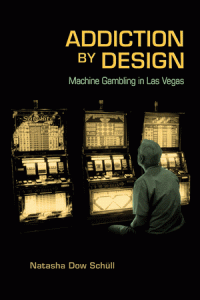Natasha Dow Schüll: Analysis
[The RP’s Provocation, Artur Davis’s Rebuttal #1; Ron Granieri’s Rebuttal #2]
A RP Nation reader who opposes expanded gaming recommended the pioneering work of MIT Professor Natasha Schüll. An op-ed of Schüll’s from The Washington Post — written at the time that Maryland was considered expanded gaming — is excerpted below, and a link to her new book, Addiction by Design, is provided as well:
All forms of gambling are not created equal. Marylanders should take this into account when deciding how to vote in November’s referendum on slots.
My research as a social anthropologist has been focused on a dramatic turn that has taken place in recent decades from social forms of gambling played at tables to asocial forms played alone at video terminals. If voters endorse the proposal to alter Maryland’s constitution to allow slot machines at racetracks, residents will be exposed to devices that have been carefully designed to make them lose as much as possible.
It’s important for voters to understand how these machines work. Every feature of a slot machine — its mathematical structure, visual graphics, sound dynamics, seating and screen ergonomics — is calibrated to increase a gambler’s “time on device” and to encourage “play to extinction,” which is industry jargon for playing until all your money is gone. The machines have evolved from handles and reels to buttons and screens, from coins to credit cards, from a few games a minute to hundreds. Inside, complicated algorithms perform a high-tech version of “loading the dice” — deceptions no self-respecting casino would ever allow in table gambling. The machines are designed to exploit aspects of human psychology, and they do it well. In the eyes of the gaming industry, this may look like success, but it comes at great expense for gamblers.
Click here to read Schüll’s entire Washington Post op-ed.










Leave a Reply